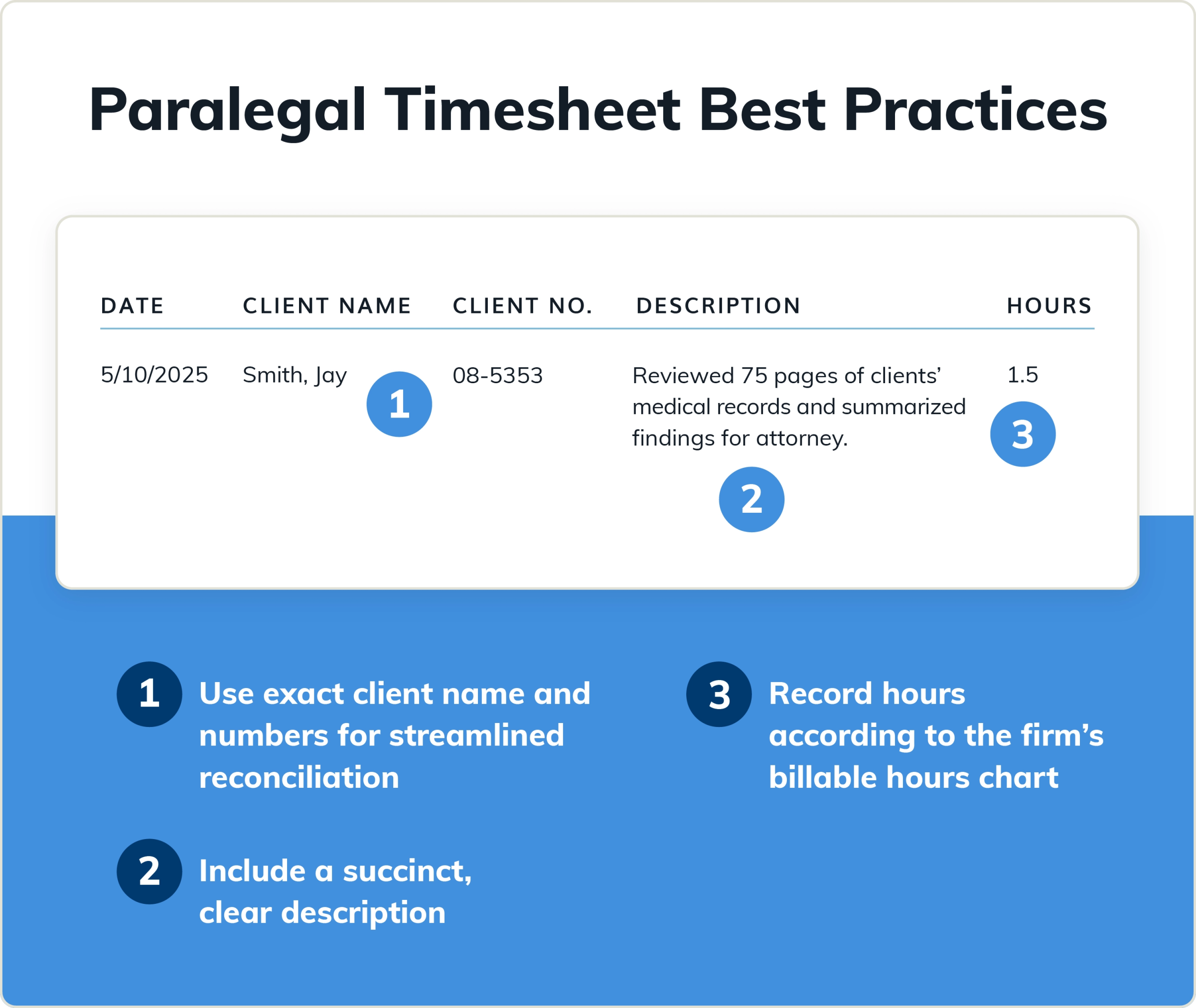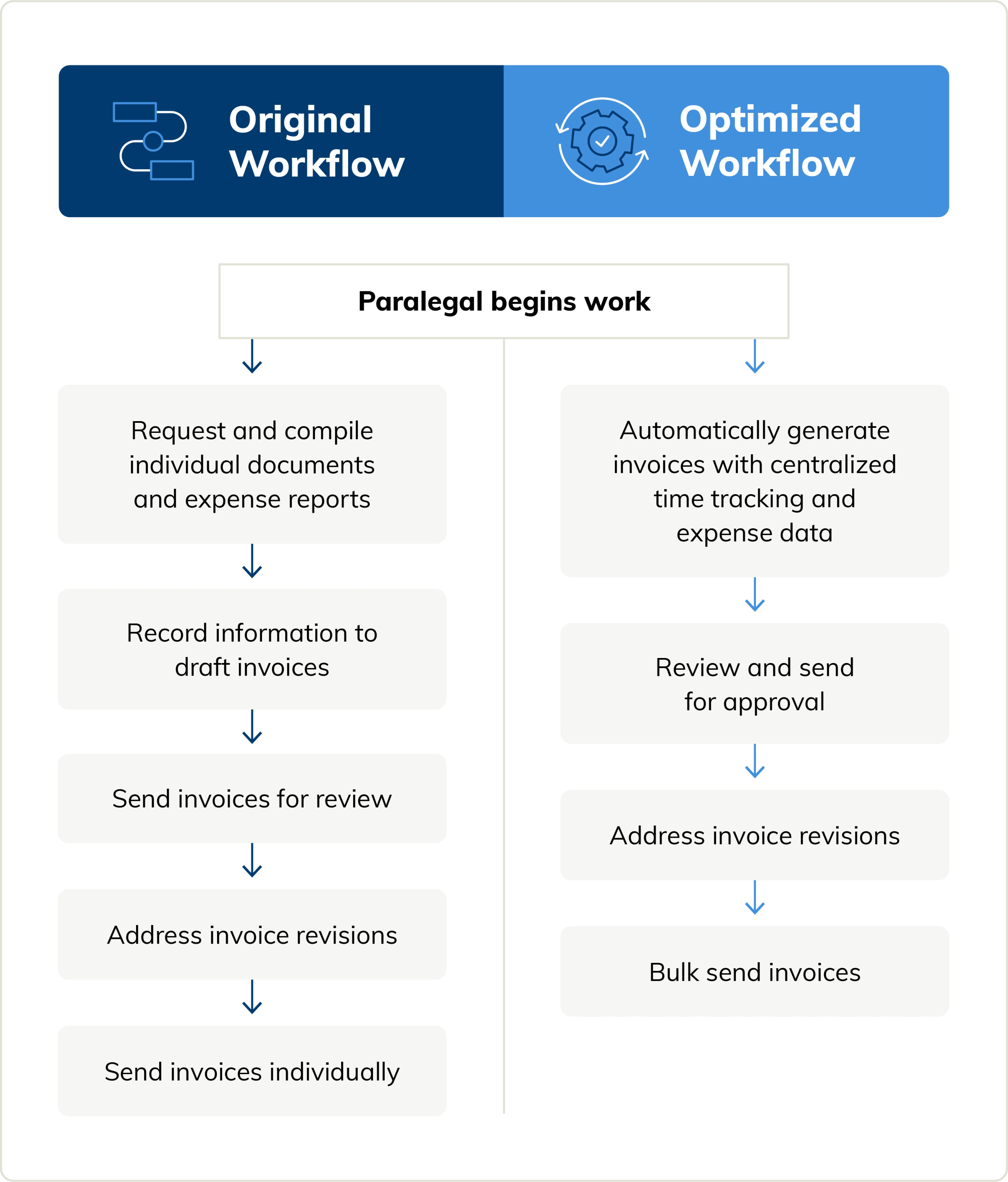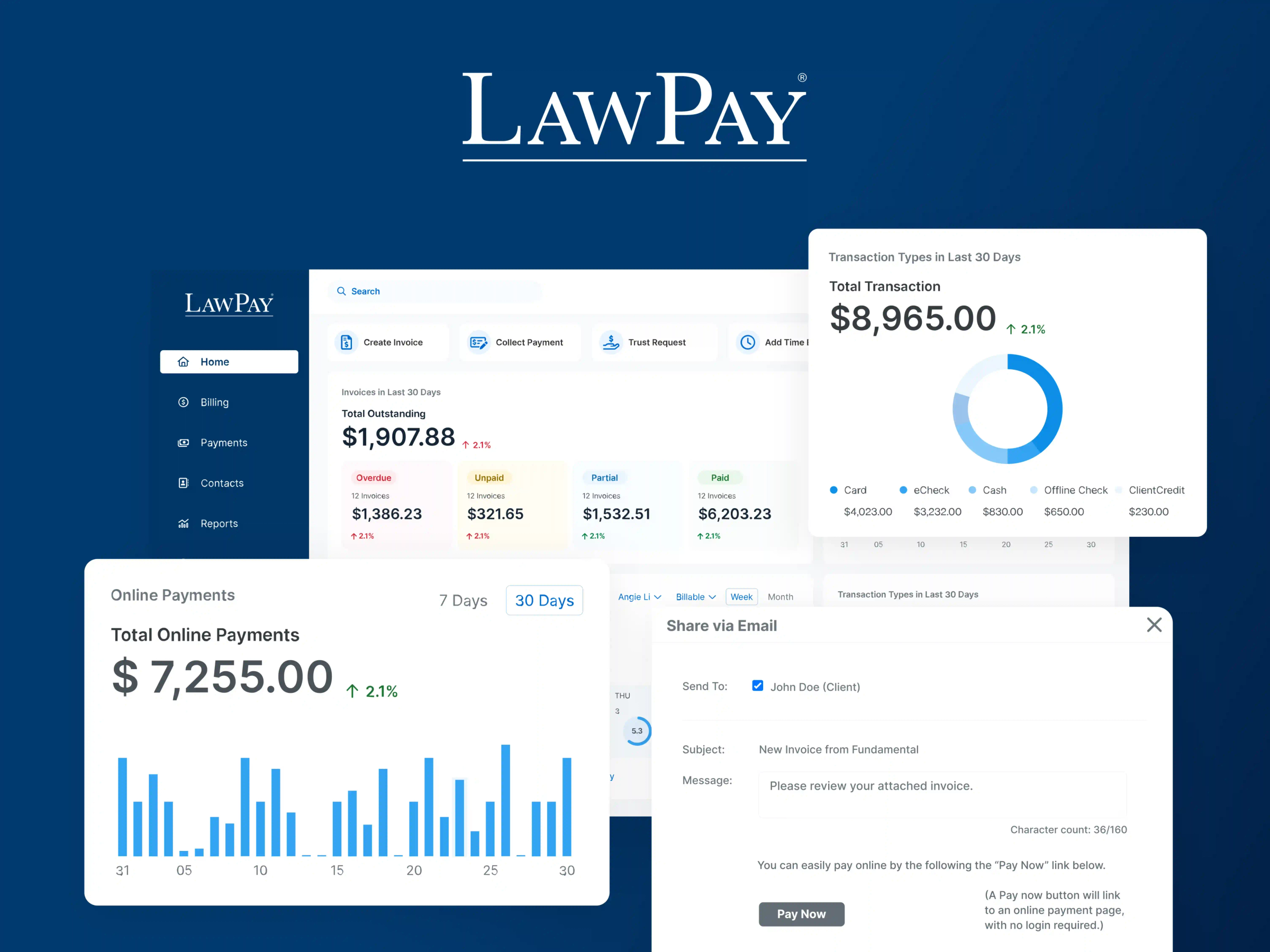Maximizing your law firm's paralegal billable hours can not only help boost revenue but also ensure excellent client service. However, how do you effectively and ethically bill clients for paralegal work?
A standardized billing and time-tracking process, clear expectations, and efficient workflows are ways that can help effectively track the time and tasks completed by paralegals, maintain compliance, ensure accurate client invoicing, and prevent revenue loss. As a result, paralegals can spend less time fixing time entries and more effort on billable work.
In this article, we’ll walk through which tasks are billable, what fees and formats make sense for firms, and how legal billing software can streamline tasks. You’ll also find sample entries, templates, and productivity tips to help you put together guidelines for your stafff.
What Types of Paralegal Services Are Billable?
ABA Model Guidelines for the Utilization of Paralegals emphasizes that paralegal billable hours should reflect work that contributes meaningfully to the client’s case. This can include preparing discovery materials, interviewing witnesses, or managing exhibits for trial. Paralegals must perform these tasks under attorney supervision and not give any legal advice or represent clients in court independently.
The key standard is this: If a law firm can reasonably bill a client for an attorney performing the task, it’s likely billable when done by a paralegal. Clear documentation of these billable tasks ensures ethical compliance and improves the accuracy of time entries, productivity metrics, and client trust.
Here are some common examples of billable paralegal services:
Document review and preparation
Legal research
Drafting legal documents
Discovery and investigation work
Trial preparation
Client meetings
Deposition and hearing support
What Are Examples of Non-Billable Paralegal Services?
The difference between billable and non-billable paralegal services comes down to the tasks performed and who they are performed for. Non-billable paralegal services typically include administrative work or work unrelated to advancing the client’s case, including internal training sessions, photocopying, and scheduling.
Think of non-billable hours as the behind-the-scenes responsibilities supporting the firm's overall operations. They are important, yes, but not tasks you should charge a client for. Tracking these hours is still crucial for calculating utilization goals, but they won’t appear on an invoice.
Here are common examples of non-billable paralegal services:
Filing and organizing internal office documents
Attending general staff meetings
Training or onboarding new hires
Time spent correcting billing entries
Administrative tasks like scheduling duties unrelated to casework
Handling IT or office equipment issues
How Many Hours Do Paralegals Work on Average?
According to the U.S. Bureau of Labor Statistics, paralegals and legal assistants typically work full time. Paralegals at litigation-heavy firms may log more hours than those in transactional practices or corporate in-house departments.
Several factors influence how many hours paralegals work each week:
Practice area (e.g., litigation vs. estate planning)
Firm size and staffing levels
Case deadlines and court schedules
Billable hour requirements or expectations
Administrative responsibilities not tied to client matters
How Do Firms Set Paralegal Fees?
Firms set paralegal rates based on experience, location, practice area, and the complexity of the work involved. While some firms use a flat hourly rate, others adjust rates for senior paralegals or legal specialists with niche expertise.
Firms can also weigh market benchmarks and client expectations when pricing paralegal services. Overall, rates must reflect the value of the work without undercutting profitability or other financial benchmarks.
Here are a few criteria law firms typically consider when setting paralegal rates:
Years of experience and certifications
Practice area specialization (e.g., litigation, IP, immigration)
Geographic location and local market rates
Billing structure (hourly, flat fee, contingency support)
Complexity of the assigned work
Client expectations and price sensitivity
What’s the Average Paralegal Hourly Rate?
According to the U.S. Bureau of Labor Statistics, the average hourly wage for paralegals and legal assistants in 2024 was $29.33, translating to an annual salary of roughly $61K based on a 40-hour workweek.
It’s important to note that this number reflects the average base employee wages paid to paralegals, not the hourly rate law firms charge clients for paralegal work. Firms typically set prices at a higher rate to ensure a healthy profit margin and account for factors like risk, type of case, and market rates.
Depending on the market, that rate can range from $75 to $200 per hour or more, especially for highly specialized or senior-level paralegals.
How Can Law Firms Bill for Paralegal Work?
Law firms can bill for paralegal work in several ways, such as hourly billing, contingency fees, or flat fees, depending on the engagement structure and the nature of the services provided. Most firms use paralegal support to increase efficiency and reduce costs, but those savings only translate if the billing structure is clear and strategic.
Whether your firm is billing by the hour or packaging paralegal time into flat fees, it’s important to set expectations early and document everything in your fee agreement. This ensures clients understand what they’re being billed for and why.
Here are a few common ways firms bill for paralegal services:
Hourly billing: The most common method; paralegal time is billed based on actual hours worked, often at a lower rate than attorney time.
Flat fees: Paralegal work is bundled into a fixed-fee package, making client costs predictable.
Contingency: Paralegal time is absorbed into the overall contingency fee in some practice areas, like personal injury.
Retainers: Paralegal time is billed against an advance payment held in trust, just like attorney time.
Unbundled legal services: Paralegals assist with specific, limited-scope tasks billed separately from full legal representation.
Sliding scale fees: Some firms offer reduced paralegal billing rates based on client income or need, especially in family or immigration law settings.
How Can Paralegals Use Billable Hours Charts?
A paralegal billable hours chart is a reference tool that lists common paralegal tasks alongside their billing codes and timekeeping guidelines. It helps improve accuracy and consistency in legal timekeeping by providing a quick way to determine whether a task is billable and how to categorize it.
Paralegal billable hours charts help standardize billing across the firm, reduce errors, and simplify the review process for both attorneys and clients. They also help paralegals see where time is going, spot trends in their workload, and improve overall efficiency.
To create or refine your firm’s system, check out our complete guide to the attorney billable hours chart; most of the same principles apply to paralegals, too.
Paralegal Billing Entry Examples
Clear, concise billing entries don’t just support accurate invoices; they also help protect the firm in an audit or client dispute. Below are a few paralegal billing entry examples to use as inspiration or add to your billing template.
Example of an incorrect billing entry
DATE | CLIENT NAME | CLIENT No. | DESCRIPTION OF MATTER | HOURS |
|---|---|---|---|---|
2/4/2025 | Doe, Jane | Researched for the client | 3.5 | |
2/4/2025 | Jane Doe | 10-045.001 | Created Summons and Complaint and revised | 4.2 |
Example of a correct paralegal billing entry
DATE | CLIENT NAME | CLIENT No. | DESCRIPTION OF MATTER | HOURS |
|---|---|---|---|---|
1/31/2025 | Doe, Jane | 10-045.001 | Researched in the law library for forms upon which to base client complaints. Found usable examples in Am. Jur. PDF and West’s Legal Form. | 1.8 |
2/4/2025 | Doe, Jane | 10-045.001 | Began drafting the Complaint. Also used elements from forms found on Westlaw. Finished the First Cause of Action regarding negligence. | 0.6 |
2/6/2025 | Doe, Jane | 10-045.001 | Finished drafting the client’s Summons and Complaint, including the second cause of action covering negligence per se. |
Need more examples? Explore our full list of sample billing languages for attorneys to help your team maintain clarity, accuracy, and compliance in every entry.

How Does Efficient Paralegal Billing Help Firms?
Efficient paralegal billing helps law firms boost profitability, reduce bottlenecks, and deliver responsive client service. When firms can clearly account for paralegal work, they can better allocate resources, price services accurately, and avoid revenue leakage from untracked hours.
For solo and small firms, paralegal billing is especially powerful. By delegating appropriate tasks to trained paralegals and tracking their time effectively, attorneys can focus on higher-value legal work, maximizing billable potential across the team.
Benefits of efficient paralegal billing include:
Increased efficiency and productivity
Improved cost management
Enhanced case management and preparation
The ability to handle a higher volume of cases
Increased specialization and expertise
Improved client satisfaction
Better utilization of lawyer time and resources
Access to technology and research tools

Best Practices for Paralegal Billing
Even the most skilled paralegal can lose billable time without the right systems in place. Clear guidelines, consistent processes, and the right tools make it easier to track work accurately and get paid for it. Here’s how paralegals and law firm decision-makers can improve billing accuracy, avoid revenue loss, and streamline timekeeping.
Follow Billing Guidelines
A standardized billing process is the foundation of reliable timekeeping. Every paralegal in the firm should follow the same paralegal billable hours template. Ideally, one that matches the attorney time sheet and reflects the firm’s preferred task codes, formats, and categorization structure.
That said, not all clients or matters are created equal. Some retainers may cap certain tasks or use alternate fee arrangements, so it’s important to tailor your approach when needed. A firm-wide framework should act as the default, with documented exceptions built in for unique cases.
Following ethical billing guidelines is equally important. Avoid vague or lumped entries, and always confirm that the time you record aligns with what’s permitted under the engagement agreement and local rules of professional conduct.
Record Time and Expenses in Real Time
Recording time and expenses in real time is an effective way to improve accuracy and increase billable hours. When paralegals wait until the end of the day, or worse, the end of the week, to log tasks, it’s easy to forget details, underestimate effort, or skip over billable work entirely.
Using digital timers or time-tracking software ensures that every minute spent on client work is documented, even if the task is brief. This habit also creates cleaner billing narratives and reduces time leakage, which can add up significantly over a month.
In addition to logging in real time, it’s worth setting a weekly cadence to review entries for clarity and consistency. A five-minute review at the end of the week can catch errors early, before invoices go out, and give a clearer picture of productivity trends over time.
Elaborate on Time and Expense Entries
The more clearly each time entry is described, the easier it is for clients and supervising attorneys to understand the value of the work.
For example, instead of writing “prepared documents,” an effective entry might say: “Drafted the first version of discovery response to opposing counsel’s interrogatories.” This kind of detail supports the invoice, builds trust, and reduces the likelihood of invoice disputes or write-downs.
This also helps clarify the distinction between billable and non-billable work. Being specific helps allocate time correctly and ensures that nothing valuable slips through the cracks.
Optimize Workflows
Efficient paralegal billing starts with intentional workflow design. Evaluate how much time paralegals spend on tasks and how billing outcomes align with firm-wide goals. Regularly reviewing billing metrics like utilization rate, realization rate, and cash flow performance can help identify gaps that slow down revenue.
It also means checking in to see if paralegals are doing the right kind of work. When routine administrative tasks or unclear handoffs clutter a paralegal’s day, it reduces capacity for more strategic tasks like client interviews, case law research, and drafting.
As a result, automating time tracking, expense entry, and invoice generation gives paralegals more time to focus on high-value tasks. If you haven't optimized your firm's billing workflow, assess how your current process works and where you can make changes to ensure efficiency and security.

Send Bills Consistently
Make sure to send your invoices within one month of performing services. Clients are more likely to pay a bill if it is delivered quickly, when the services are still fresh in their minds. When you send invoices regularly, clients are less likely to forget details, question charges, or delay payment.
Using legal billing software with automated reminders and built-in review tools makes it easier to close the loop between logged time and sent invoices. A steady rhythm of billing gives clients predictable expectations and helps you stay ahead of deadlines, rather than scrambling to catch up.
Use Legal Billing Software
Manually tracking paralegal time across spreadsheets or notebooks leaves too much room for human error. Legal billing software brings structure, automation, and peace of mind to the entire process, especially when multiple team members are contributing to the same matter.
The right platform can streamline everything from task tracking to invoicing. Look for billing tools designed for law firms that include features like:
Time tracking: Enables accurate and seamless time capture with built-in timers and default paralegal billing entries
Credit card processing: Provides firms with a system to accept credit card payments from clients, including Visa, Mastercard, and American Express.
Electronic check processing: Offers clients the option to pay via electronic check payments, which can be a convenient and secure alternative to paper checks.
Automated billing (such as LawPay's Quick Bill feature): Allows law firms set up automatic billing for recurring payments, such as retainer fees or monthly payments.
Customized invoicing: Provides the ability to customized invoices that reflect your law firm's branding and include detailed descriptions of the services provided.
Online payment portal: Allows clients to securely make payments online.
Mobile app: Helps Attorneys manage payments and invoicing on the go.
Security: Advanced security measures protect your firm and clients' personal and financial information.
Manage Paralegal Billable Hours Better With LawPay
Optimizing your workflow withsoftware can make or break a firm’s cash flow and credibility. This paralegal billing cheat sheet gives you a complete overview of what’s billable, what’s not, how to track hours, and best practices for consistent, accurate billing.
LawPay’slegal billing solution is built specifically for legal professionals, including paralegals. With features like built-in timers, customizable billing templates, and centralized dashboards, your team can manage billable hours and invoices with clarity and confidence.
If you are looking for other ways to increase efficiency and boost revenue for your firm, we invite you to schedule a demo to learn more about LawPay's legal billing solutions.
Schedule a demo to see what LawPay can offer your firm.
Get a demo
About the author

Hannah DeFreitasSenior Content Strategist and Blog Specialist8am
Hannah DeFreitas (née Bruno) is a Senior Content Strategist and Blog Specialist for 8am, a leading professional business solution, and a senior content writer for 8am. Her work spans long-form articles, thought leadership, product storytelling, and conversion copy that distills complex legal and fintech topics into clear, human language. With nearly a decade of experience, she specializes in transforming research and data into narratives that enable professionals to work smarter and serve their clients more effectively.
